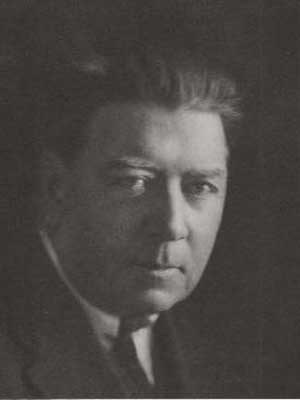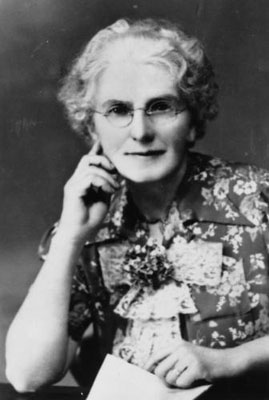Wot's in a name? -- she sez . . . An' then she sighs,
An' clasps 'er little 'ands, an' rolls 'er eyes.
"A rose," she sez, "be any other name
Would smell the same.
Oh, w'erefore art you Romeo, young sir?
Chuck yer ole pot, an' change yer moniker!"
Doreen an' me, we bin to see a show --
The swell two-dollar touch. Bong tong, yeh know.
A chair apiece wiv velvit on the seat;
A slap-up treat.
The drarmer's writ be Shakespeare, years ago,
About a barmy goat called Romeo.
"Lady, be yonder moon I swear!" sez 'e.
An' then 'e climbs up on the balkiney;
An' there they smooge a treat, wiv pretty words
Like two love-birds.
I nudge Doreen. She whispers, "Ain't it grand!"
'Er eyes is shining an' I squeeze 'er 'and.
'Wot's in a name?" she sez. 'Struth, I dunno.
Billo is just as good as Romeo.
She may be Juli-er or Juli-et --
'E loves 'er yet.
If she's the tart 'e wants, then she's 'is queen,
Names never count ... But ar, I like "Doreen!"
A sweeter, dearer sound I never 'eard;
Ther's music 'angs around that little word,
Doreen! ... But wot was this I starts to say
About the play?
I'm off me beat. But when a bloke's in love
'Is thorts turns 'er way, like a 'omin' dove.
This Romeo 'e's lurkin' wiv a crew --
A dead tough crowd o' crooks -- called Montague.
'Is cliner's push -- wot's nicknamed Capulet --
They 'as 'em set.
Fair narks they are, jist like them back-street clicks,
Ixcep' they fights wiv skewers 'stid o' bricks.
Wot's in a name? Wot's in a string o' words?
They scraps in ole Verona wiv the'r swords,
An' never give a bloke a stray dog's chance,
An' that's Romance.
But when they deals it out wiv bricks an' boots
In Little Lon., they're low, degraded broots.
Wot's jist plain stoush wiv us, right 'ere to-day,
Is "valler" if yer fur enough away.
Some time, some writer bloke will do the trick
Wiv Ginger Mick,
Of Spadger's Lane.
'E'll be a Romeo,
When 'e's bin dead five 'undred years or so.
Fair Juli-et, she gives 'er boy the tip.
Sez she: "Don't sling that crowd o' mine no lip;
An' if you run agin a Capulet,
Jist do a get."
'E swears 'e's done wiv lash; 'e'll chuck it clean.
(Same as I done when I first met Doreen.)
They smooge some more at that. Ar, strike me blue!
It gimme Joes to sit an' watch them two! '
E'd break away an' start to say good-bye,
An' then she'd sigh
"Ow, Ro-me-o!" an' git a strangle-holt,
An' 'ang around 'im like she feared 'e'd bolt.
Nex' day 'e words a gorspil cove about
A secret weddin'; an' they plan it out.
'E spouts a piece about 'ow 'e's bewitched:
Then they git 'itched ...
Now, 'ere's the place where I fair git the pip!
She's 'is for keeps, an' yet 'e lets 'er slip!
Ar! but 'e makes me sick! A fair gazob!
E's jist the glarsey on the soulful sob,
'E'll sigh and spruik, a' 'owl a love-sick vow --
(The silly cow!)
But when 'e's got 'er, spliced an' on the straight
'E crools the pitch, an' tries to kid it's Fate.
Aw! Fate me foot! Instid of slopin' soon
As 'e was wed, off on 'is 'oneymoon,
'Im an' 'is cobber, called Mick Curio,
They 'ave to go
An' mix it wiv that push o' Capulets.
They look fer trouble; an' it's wot they gets.
A tug named Tyball (cousin to the skirt)
Sprags 'em an' makes a start to sling off dirt.
Nex' minnit there's a reel ole ding-dong go ---
'Arf round or so.
Mick Curio, 'e gets it in the neck,
"Ar rats!" 'e sez, an' passes in 'is check.
Quite natchril, Romeo gits wet as 'ell.
"It's me or you!" 'e 'owls, an' wiv a yell,
Plunks Tyball through the gizzard wiv 'is sword,
'Ow I ongcored!
"Put in the boot!" I sez. "Put in the boot!"
"'Ush!" sez Doreen ... "Shame!" sez some silly coot.
Then Romeo, 'e dunno wot to do.
The cops gits busy, like they allwiz do,
An' nose around until 'e gits blue funk
An' does a bunk.
They wants 'is tart to wed some other guy.
"Ah, strike!" she sez. "I wish that I could die!"
Now, this 'ere gorspil bloke's a fair shrewd 'ead.
Sez 'e "I'll dope yeh, so they'll
think yer dead."
(I tips 'e was a cunnin' sort, wot knoo
A thing or two.)
She takes 'is knock-out drops, up in 'er room:
They think she's snuffed, an' plant 'er in 'er tomb.
Then things gits mixed a treat an' starts to whirl.
'Ere's Romeo comes back an' finds 'is girl
Tucked in 'er little coffing, cold an' stiff,
An' in a jiff,
'E swallows lysol, throws a fancy fit,
'Ead over turkey, an' 'is soul 'as flit.
Then Juli-et wakes up an' sees 'im there,
Turns on the water-works an' tears 'er 'air,
"Dear love," she sez, "I cannot live alone!"
An' wiv a moan,
She grabs 'is pockit knife, an' ends 'er cares ...
"
Peanuts or lollies!" sez a boy upstairs.
First published in
The Bulletin, 16 July 1914, and again in the same magazine on 1 February 1950 and 29 January 1980;
and later in
The Songs of a Sentimental Bloke by C. J. Dennis, 1915;
Favourite Australian Poems edited by Ian Mudie, 1963;
From the Ballads to Brennan edited by T. Inglis Moore, 1964;
Australian Kaleidoscope edited by Barbara Ker Wilson, 1968;
Selected Works of C. J. Dennis by C. J. Dennis, 1988;
Favourite Poems of C. J. Dennis by C. J. Dennis, 1989;
The Language of Love: An Anthology of Australian Love Letters, Poetry and Prose edited by Pamela Allardice, 1991;
The Penguin Book of Australian Ballads edited by Elizabeth Webby and Philip Butterss, 1993;
The Illustrated Treasury of Australian Verse compiled by Beatrice Davis, 1996;
Our Country: Classic Australian Poetry: From the Colonial Ballads to Paterson & Lawson edited by Michael Cook, 2004;
Two Centuries of Australian Poetry edited by Kathrine Bell, 2007;
Sixty Classic Australian Poems edited by Geoff Page, 2009;
The Puncher & Wattman Anthology of Australian Poetry edited by John Leonard, 2009;
The Sentimental Bloke: The Poems of C. J. Dennis by C. J. Dennis, 2010; and
100 Australian poems of Love and Loss edited by Jamie Grant, 2011.
Author reference sites: C.J. Dennis,
Austlit,
Australian Dictionary of Biography,
Australian Poetry LibrarySee
also.


